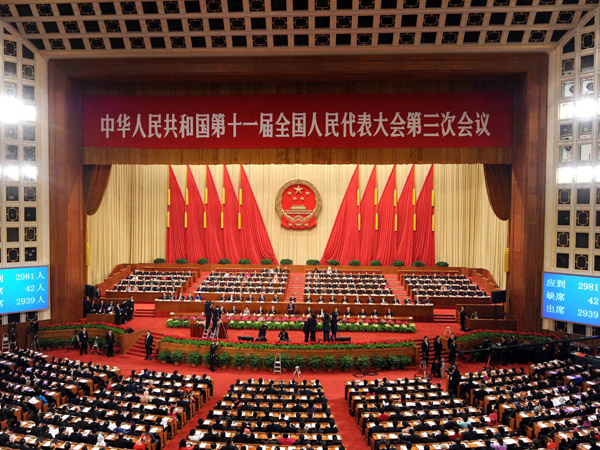China starts parliament session
 |
|
The Third Session of the 11th National People's Congress (NPC) opens at the Great Hall of the People in Beijing, capital of China, March 5, 2010. [Xinhua] |
Chinese Premier Wen Jiabao warned Friday the nation still faces "a very complex situation" in the wake of the "most difficult year for economic development" since the new millennium.
Delivering his work report to the National People's Congress (NPC), the parliament, Wen set the economic growth target for 2010 at "about 8 percent."
China's economy expanded 8.7 percent in 2009, staging a faster-than-expected recovery after being hit by the worst global financial crisis in decades thanks to a raft of stimulus measures.
ECONOMY
Putting the economy "on a sound footing," the government needs to guide all sectors to focus on transforming economic growth pattern and restructuring economy, Wen said in the report.
He acknowledged that 2010 is a "crucial year" for continuing to combat the global financial crisis, maintaining "steady and rapid" economic development, and accelerating the transformation of growth pattern.
It is also an important year for achieving all the targets of the 11th Five-Year Plan (2006-2010) and laying a solid foundation for the 12th Five-Year Plan (2011-2015), he said.
"Although this year's development environment may be better than last year's, we still face a very complex situation," Wen told nearly 3,000 NPC deputies at the Great Hall of the People in downtown Beijing.
Other key economic and social targets included creating more than 9 million jobs in cities, keeping urban registered unemployment rate under 4.6 percent and keeping the rise in consumer prices at about 3 percent.
Wen said while the foundation for economic turnaround becomes stronger, he cautioned it should not be interpreted as "fundamental improvement."
Listing key government tasks, Wen said it will continue to implement a proactive fiscal policy and continue to implement the stimulus package which was unveiled in late 2008 that included a 4-trillion yuan (585.5 billion U.S. dollars) two-year investment.
Lawmaker Li Dongsheng from Guangdong Province, chairman of China's largest color TV producer TCL Corporation, said the proactive fiscal policy is in line with the company's current business development and it demands more "implementing techniques."
Li said more flexibility is needed in carrying out the economic policy as China still faces "extremely complicated economic picture," including unclear export prospect.
SOCIAL SPENDING
Wen's report outlined measures to boost spending on employment, low-income housing, education, energy conservation, environmental protection, innovation and social security net.
After six consecutive years of gains in grain output and rural incomes, Wen said "steady rural development should be promoted."
Lawmaker Chen Xuerong, Party chief of Dongjiao Village in Guangdong's Zhanjiang City, said the construction of 20-km new roads in her village boosted the sale of farming products as well as farmers' income.
Chen said the building of each kilometer of the road was subsidized with 150,000 yuan by the government. "The stimulus measures have not only boosted growth but also improved livelihood of commoners."
On the country's army of migrant workers, Wen said their concerns will be addressed to ensure they "receive the same treatment as urbanites."
The government will carry out the reform of household registration system and relax requirements on farmers' settlement in small cities.
While the pressure on employment grows and structural shortage of labor deepens, Wen said the government will "do everything in our power to stimulate employment" and will allocate 43.3 billion yuan in this regard.
He promised to "resolutely reverse a widening income gap" and will not only make the "pie" of social wealth bigger but also well distribute it via "rational income distribution."
Wen vowed to "resolutely curb soaring housing prices" and crack down on such acts as "keeping land unused, property hoarding and price rigging."
LOW CARBON ECONOMY
In the report, Wen said China will build an industrial system and consumption pattern with low carbon emissions.
A draft plan for national economic and social development submitted to the NPC also pledged the country would formulate and implement policies to meet its action targets for limits on greenhouse gas emissions, which aims 40 to 45 percent reduction in carbon intensity by 2020 from 2005 levels.
Wen said the government will actively develop renewable energy-powered motors and low-carbon technologies such as smart power grids.
The government will also expand the trial of pollution rights trading and reform pricing system for sewage treatment.
RECOVERY IMPETUS?
Wen's promise on economic growth sent Asian shares slightly higher.
Even though Chinese exports dropped 16 percent last year, China still overtook Germany to become the world's largest exporter. Many domestic companies have become beneficiaries of China's latest stimulus measures.
TCL Corporation's Li said his company seized the opportunity of market recovery and regained profits after experiencing overseas business chill, thanks to a raft of measures including adjusting export tax rebates and maintaining stability of yuan's exchange rate.
"Our good momentum has extended to the start of this year. Currently, we have received a great deal of orders. Our products are in short supply,a sharp contrast against the same period last year," he said.
However, Wen warned there is "insufficient internal impetus driving economic growth," with other obstacles such as "weak innovation capability" and "serious overcapacity problems."
Wen said the government will strictly control expenditures and new projects, and prevent "image and vanity projects."
He also vowed to fight corruption, saying officials "must resolutely" implement the central leadership’s regulations on reporting the main facts concerning their personal financial situations and property, including their incomes, housing and investments, as well as the jobs of their spouses and children.
Wen also promised to "create conditions for people to criticize and oversee the government."
 0
0 






